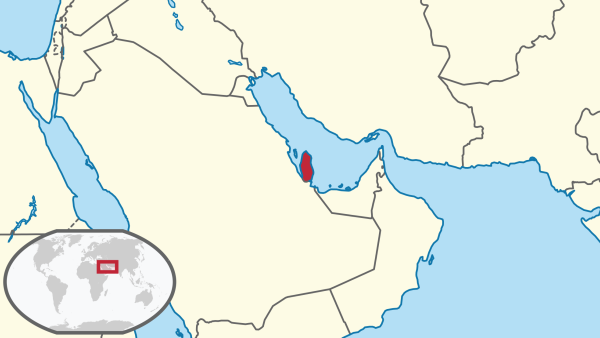- Saudi's crown prince has played down the significance of the ongoing Gulf diplomatic crisis
- Relations between Qatar and Saudi Arabia are in a state of deadlock
- Last week, a former Trump advisor called the rift "the single most important thing [...] in the world.”
- Bin Salman is seeking to improve Saudi Arabia's international image
by Rosie Alfatlawi
‘Qatar is a very, very, very small issue,’ Saudi Arabia’s Crown Prince Mohammed bin Salman said on Thursday.
Riyadh was among four nations who cut all diplomatic ties with Doha on June 5, launching an air, land and sea blockade. The tiny Gulf nation is accused by its neighbors of funding terror.
Bin Salman made the comments in an interview with Reuters about Saudi Arabia’s development projects.
When asked if “the Gulf-Qatar rift or Yemen war” would have any impact on the “Vision 2030” economic plan launched by the prince in 2016, he dismissed the significance of the Gulf crisis.
“We are very committed to have our country safe, far away from any disturbance,” he added.
- Trump's Saudi Visit Sparked the Qatar Crisis, Says Former Advisor Bannon
- Trump Changes Mind on Handshake With Qatar Emir in Awkward GIF
His emphatic suggestion that the dispute with Qatar is a “small issue” aroused amusement among some Saudis online.
#ولي_العهد_مشكله_قطر_صغيره
— هندآل سعو(@AbscefgAmerra) October 26, 2017
it’s
very tiny tiny pic.twitter.com/eZHD7tM9vS
That Bin Salman shrugged off the importance of the Qatar crisis can perhaps be seen as an attempt to deflect attention from the political deadlock created by the blockade.
After Doha rejected the list of 13 demands to end the dispute early in July, the former GCC allies entered into a period of apparent diplomatic paralysis.
Following reports of a breakthrough phone call between Bin Salman and Qatar’s Emir in September, Riyadh suspended all negotiations accusing Doha of “distorting the facts.”
His words also echoed something of the tone taken more recently by U.S. President Donald Trump, who suggested last month that the crisis could be “solved fairly easily.”
Despite initially appearing to back Qatar’s isolation by its neighbors, Trump has seemed to soften his approach since August, in line with his administration, offering to mediate talks.
Qatar's Emir Sheikh Tamim bin Hamad Al Thani claimed on Friday that Trump had proposed to host talks in the U.S.
#ولي_العهد_مشكله_قطر_صغيره
— عبدالله (@a_abdullhs) October 26, 2017
Mood pic.twitter.com/Gr0FW0qdFP
The claim offers a stark contrast, however, to the views of former key Trump advisor Steven Bannon.
On Monday, Bannon called the situation in Qatar “the single most important thing that’s happening in the world.”
The ousted White House chief strategist praised the boycott of Qatar, implying it came as a result of the U.S. President’s visit two weeks earlier.
#ولي_العهد_مشكله_قطر_صغيره
— ™ العتيبي (@m_81933) October 26, 2017
Very very very small
Bin Salman has recently gone on a charm offensive apparently aimed at attracting investment from the West.
He told a conference of international business people on Tuesday that he would “destroy extremism” and support a “moderate Islam” in Saudi Arabia.
The prince was announcing a $500 billion project to build a mega-city on the Red Sea. Recent moves to reform Saudi law including allowing women to drive have also drawn international praise.
His deemphasis of the Qatar crisis may well play into this effort to improve Saudi Arabia's global image.
When pressed on the Yemen war in the same interview, he said sarcastically: “If we want to create another Hezbollah in the Middle East, then let’s change our policy in Yemen.”
“We’re pursuing until we can be sure that nothing will happen there like Hezbollah again, because Yemen is more dangerous than Lebanon. It’s next to Bab al-Mandab so if something happens there, that means 10 percent of world trade stops. This is the crisis.”
Leaked emails in August suggested that the prince, also the country’s defense minister, “wants out” of the conflict he began with a Saudi-led intervention against Houthi rebels in March 2015.
The nearly three-year war has cost at least 10,000 Yemeni civilian lives.







